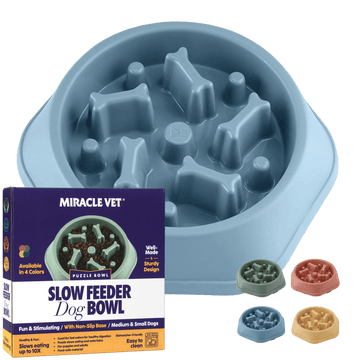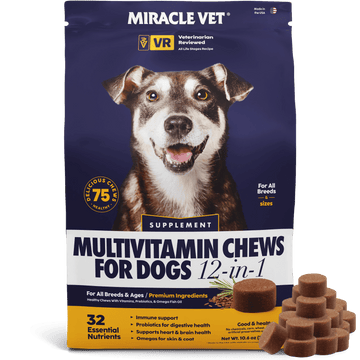Looking after your dog's digestive system is a good way to help their long term health, but some dogs have more sensitive tummies compared to their doggy friends, at Miracle Vet we look at ways to help cater for more sensitive stomachs.
Why does my dog have a sensitive stomach?
Some dogs, regardless of breed, will be more prone to vomiting and diarrhea, this can be down to their nature of eating things they shouldn’t but can also be down to allergies or sensitivities.
Your dogs sensitive stomach may be due to:
- Food allergies or sensitivities: Just like humans, dogs can develop allergies or sensitivities to certain ingredients in their food. Common culprits include proteins (such as beef, chicken, or dairy), grains (like wheat or corn), and artificial additives. These allergies or sensitivities can lead to digestive issues, including upset stomachs.
- Changes in diet: Abrupt changes in a dog's diet can disrupt their digestive system and cause gastrointestinal upset. It's important to introduce new foods gradually to allow their digestive system to adjust.
- Digestive disorders: Some dogs may have underlying digestive disorders, such as irritable bowel syndrome (IBS) or inflammatory bowel disease (IBD). These conditions can make their stomachs more sensitive to certain foods or environmental factors.
- Eating too quickly: Dogs that eat too quickly can swallow air and cause indigestion. Additionally, gobbling down food without proper chewing can make it harder for the stomach to break down the food, leading to digestive discomfort.A slow feeder dog bowl can help your dog slow their meal times down.
- Eating inappropriate or spoiled food: Dogs are known for their scavenging behavior, and they may consume food that is spoiled, rancid, or not meant for their consumption. This can lead to stomach upset and gastrointestinal issues.
- Stress or anxiety: Dogs can experience digestive upset due to stress or anxiety. Events like moving to a new home, changes in routine, or separation anxiety can affect their digestive system and cause gastrointestinal disturbances.
Dog Food that prevents vomiting and Diarrhea
When it comes to choosing dog food for dogs with sensitive tummies, it's important to look for formulas that are easily digestible and gentle on the stomach.
- Limited Ingredient Diet (LID): Choose dog foods with a limited number of ingredients, this reduces the chances of triggering an adverse reaction. These dog food formulas typically feature a single source of protein and a few easily digestible carbohydrates.
- Grain-Free or Limited Grains: Some dogs with sensitive stomachs may have sensitivities to grains. While grain-free diets have been popular, recent research has suggested a potential link between grain-free diets and heart issues, so it's important to consult with a veterinarian. Alternatively, you can choose dog foods with limited grains, such as those that contain easily digestible grains like rice or oats.
- Probiotics and Digestive Enzymes: Look for dog foods that contain added probiotics or digestive enzymes. These ingredients can help support a healthy gut and aid in digestion.
- Prescription or veterinary diets: In severe cases, your veterinarian may recommend a prescription or veterinary diet formulated specifically for dogs with sensitive stomachs or food allergies. These diets are carefully crafted to provide balanced nutrition while being gentle on the digestive system.
Remember, every dog is different, and what works for one dog may not work for another. It's essential to consult with your veterinarian to determine the underlying cause of your dog's sensitive stomach and to get personalized recommendations for their dietary needs.
When it comes to finding dog food for sensitive tummies, look for options that are easily digestible and gentle on the digestive system.
Subscribe to Miracle Vet Probiotic Chews for Gut Health 7-in-1 Supplement Snacks for Dogs to support their digestive health.










